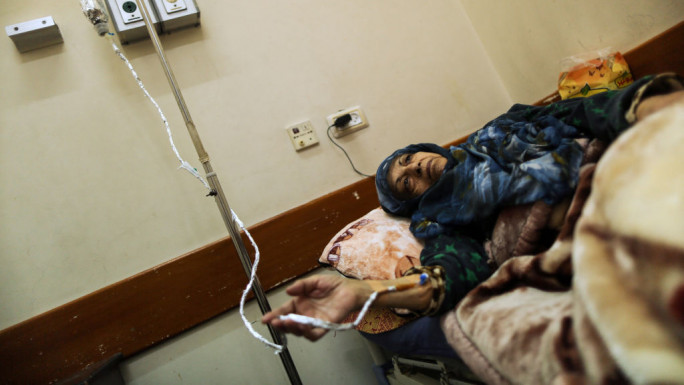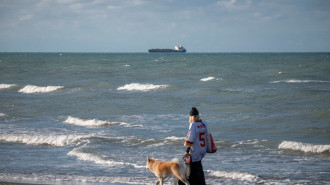Fears of cholera, water contamination in Egypt's Aswan after five die
Panic reigns supreme in the southern Egyptian province of Aswan, following the death of several people of gastrointestinal disease-related complications, including circulatory and heart arrests.
The dead, five so far, were among hundreds of locals who were admitted to four hospitals in the past few days, after suffering gastrointestinal problems, including diarrhoea, vomiting and nausea.
Residents of the southern province, around 850 kilometres south of the Egyptian capital Cairo and a few kilometres away from the Egyptian border with Sudan, are deeply alarmed.
"We are afraid because there is no clarity about the reasons behind the health problems people suffer or the fatalities that happened so far," Hani Youssef, a resident of Aswan in his mid-forties, told The New Arab.
The reasons behind the mystery diseases remain unclear, but locals attributed them to what they described as 'contaminated' drinking water.
Like in other parts of Egypt, people in Aswan depend on the Nile River for drinking water.
This comes amid reports of a cholera outbreak, caused by contaminated water and food, causing the death of hundreds of people and the sickening of thousands of others in neighbouring Sudan.
Slow government response
Official reactions to developments in Aswan have so far come short of calming the public.
On September 23, Minister of Health, Khaled Abdelgaffar, blamed E. coli, a bacterial disease caused by raw or undercooked ground meat products, raw milk and faecal contamination of vegetables, for the health problems affecting hundreds of people in the province.
Analysis of water samples in Aswan, the minister said, showed that drinking water is safe for consumption.
"Egypt has a system to ensure the safety of every water drop consumed by citizens," the minister said at a press briefing in Aswan.
The minister's remarks came days after a team of ministry specialists arrived in the southern province to investigate.
Once they got there, the team's members went to different villages and knocked on one door after another to listen to people's complaints.
They also took samples of drinking water in these villages, concluding that drinking water was not the real culprit.
On September 22, Aswan Governor, Maj. Gen. Ismail Kamal, made a tour of different villages in his province and drank tap water to prove to nervous citizens that there is nothing to fear.
The governor did the same inside one of Aswan's 108 water plants.
Abdel Sabour al-Rawy, a senior official of the state-run Water and Wastewater Company, which is responsible for dealing with sewage and supplying water to people in Aswan, backed the governor's account.
"Water samples taken from plants in the province proved to be fit for consumption," al-Rawy told TNA.
Despite these assurances, there is belief that something ominous is at play.
"The fact that such a large number of people fell sick at the same time suggests a major problem," virologist, Rushdi Youssef, told TNA.
He called for restricting movement to and from Aswan until there is a scientifically logical explanation for what is happening in the southern province.
Some government officials, including al-Rawy, and state-controlled media outlets accused those talking about the situation in Aswan of exaggerating the whole matter, only to scare tourists away from Aswan, while the southern province prepares for a new tourist season.
With a population of 1.6 million people, Aswan is a prime tourist destination, boasting a large number of important archaeological sites, including ancient Egyptian temples and museums that house precious artefacts.
However, reports of cholera-induced deaths in neighbouring Sudan are apparently casting a shadow over Aswan.
There have been videos on social media advising people to avoid drinking tap water, at least for the time being.
The last time cholera hit in Egypt was in 1947 when it caused the death of over 10,000 people, which prompted the Egyptian government to request international support.
Youssef, the Aswan resident, has stopped drinking tap water together with his other family members.
He said the explanations offered by health authorities for what is happening in the province have been unconvincing so far.
"This is why I try to stay safe as much as I can by eating at home and drinking bottled water," Youssef said.
"We will continue to do this until somebody can clear up the current mess," he added.
![Cities, such as Aswan, Egypt, which is built along the Nile Delta, are threatened by sea-level rise caused by climate change. [Getty]](/sites/default/files/styles/large_16_9/public/2021-08/GettyImages-883519044.jpg?h=b609465e&itok=UYmerjuk)




 Follow the Middle East's top stories in English at The New Arab on Google News
Follow the Middle East's top stories in English at The New Arab on Google News
![A picture shows the occupied West Bank village of al-Eizariya behind Israel's Apartheid wall on the outskirts of East Jerusalem [Getty Images]](/sites/default/files/styles/image_330x185/public/2022-11/GettyImages-1200150515.jpg?h=eec5a94e&itok=Q0NIO_eW)
![The op-ed used spurious Biblical justifications to lay claim to the southern Lebanese city of Sidon [Getty]](/sites/default/files/styles/image_330x185/public/2024-11/GettyImages-149261870.jpg?h=69f2b9d0&itok=d2wjWSis)
